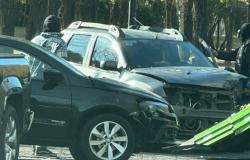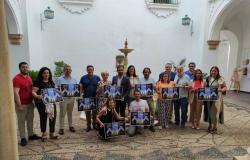What will have happened? A fun moment during a class in Taipei, Taiwan.
Jimmy Beunardeau / AFP
Internationally, Taiwan’s secondary schools are noted for their high level of civic instruction. Switzerland cannot compete with the Asian country. How is Taiwan different?
This content was published in
May 27, 2024 – 09:00
The voices and screams of class 805 can already be heard from the hallway of Sanmin Junior High School. The door to the room is open. Inside we see a large group of fourteen-year-old students typing on their tablets with maximum concentration. Welcome to the democracy class!
The students try to identify the most important actors in national politics. In addition to faces and slogans, teacher Yi Ting Jhang also shows on the board the most well-known symbols and musical pieces that are usually associated with the different political groups in the country.
Elections in class 805
“I know this one,” exclaims student Jia-Ruei, and adds: “My parents vote for him.” “Surely not,” answers her desk companion Yan-Chang Hou: “I would never give my vote to this guy.”
“After becoming familiar with the political class, we now dedicate ourselves to politics,” explains Professor Jhang, who then goes on to present, in a playful way, the proposals of the different political parties with the help of small animated comic sequences.
Professor Yi Ting Jhang has already taught democracy to hundreds of young people.
SWI swissinfo.ch
The young people of class 805 begin to discuss first in small groups and then in the entire class, before being able to electronically and secretly choose their own political priorities for Taiwan.
What we appreciate here is a trial. Sanmin Junior High School with its 400 students is one of several dozen pilot schools of the new teaching plan, which is scheduled to come into force within five years. Taiwan’s future public school curriculum aims to educate new generations to be “citizens of the world.”
“Democratic education” is the main subject in Taiwan
Although, today, “democratic or civic education” is already a main subject that has adequate resources in terms of teaching material and improvement courses for teachers, “the new curriculum takes another step towards introduce modern technologies such as generative artificial intelligence into teaching,” explains Professor Yi Ting Jhang.
With colored tables on the blackboard, the teacher presents to the students the conclusions of the bustling class: the policies and politicians chosen by the class do not converge with the political issues they favor.
“Do not be fooled by politicians and policies. Take a good look at their proposals,” adds the teacher. The amazement is capital in class. The learning of the day has been achieved.
Few countries in the world invest as many resources in democratic education as Taiwan.
Particular situation in a “geopolitical context” dominated by China
For Swiss education expert Petra Huth, Taiwan’s commitment to civic education is the result “of the history of democratization and the geopolitical context.”

Swiss political scientist and economist Petra Huth is a councilor in Anwil.
zVg
In his opinion, there is a different mood in Switzerland: “Here, many people are convinced that we already live in a perfect democracy and that it is enough to transmit this knowledge at home.”
About 24 million people live in Taiwan on an area that covers more than 36,000 km2. In the Far Eastern island state, political education is considered a survival strategy in the context of proximity to hostile countries dominated by autocratic governments, while in Switzerland – a country with an area of 41,000 km2 and almost nine million inhabitants –, surrounded by a peaceful European Union, civic education is still considered an optional subject that is ultimately unnecessary, says Huth.
Because of these disparate visions, the results are also different: “For the first time, our students have obtained the best results worldwide,” says Mei-hui Liu, a professor at National Taiwan Normal University (NTNU). English), referring to the most recent results of a large-scale comparative study.

Mei-hui Liu is a professor of Education for Democracy at National Taiwan Normal University in Taipei.
SWI swissinfo.ch
In 2022, the International Civic and Citizenship Study (ICCS) was carried out for the third time with a total of 24 States around the world. Taiwanese youth have obtained a good rating in terms of “civic knowledge”. Switzerland, however, only participated in the first study in 2009. In this survey, young Swiss students achieved rather average results.
These global studies on democratic education analyze dozens of skills and competencies, through which they try to educate young people so that they can be active citizens.
Some of the topics address issues such as the political participation of youth, the value conferred on state institutions and human rights, but also ethical questions that arise in a consumerist society.
Vote on furniture at a Tainan high school

The four-member election committee with election materials at the First Institute in Tainan City: Yi-shan Tsai (top left), Shao-fan Wang (top right), Jia-hao Liu (bottom left ) and Ding-xuan Gao.
SWI swissinfo.ch
In Tainan, a city located 350 kilometers south of Taipei, we visited a high school. During the afternoon, a four-member electoral commission scrutinizes the results of several student votes on the furniture and activities on the campus of Tainan First Senior High School.
The vote was preceded by a collection of signatures for various proposals and by debates in the school parliament. “Here we rehearse everything that will be useful for our adult lives,” emphasizes 18-year-old student Shao-fan Wang, who chairs the electoral commission and who can imagine entering politics in the future as an adult.
However, Wang is one of the few who expresses his willingness to continue political activities.
Little political activity in free time
“The majority of students declare that they do not have the desire or time for these types of activities outside of school,” says Mei-hui Liu. “In relation to the political inclusion of young generations, we still have a long way to go in Taiwan.”
Compared with other democracies, the gap between a relatively well-educated youth and the poor participation of young citizens in official politics is wider in Taiwan.
In fact, recently, a constitutional referendum that sought to harmonize the minimum age to exercise the right to vote failed due to lack of assent. While it is true that young Taiwanese have the right to sign a popular initiative and vote in referendums from the age of 18, they cannot participate in elections until they are 20 years old. In addition, those interested in a candidacy as a deputy in the national Parliament have to wait until they reach the age of 23.
In Switzerland, home economics is taught instead of politics
Despite this contradiction, political scientist and economist Petra Huth considers Taiwan as a model to follow when it comes to consolidating democratic education as a constitutive and solid part of the curricula in Swiss schools. “In Switzerland, many topics have been incorporated into Curriculum 21, for example, cooking classes. But civic education is not an independent subject, it is rather an aspect of the Sustainable Development syllabus and is integrated into the learning objectives of different subjects,” says the former director of the Dialog foundation who today serves as a municipal councilor in the town of Anwil. in the canton of Basel-Countryside.
In conversation with SWI swissinfo.ch, Petra Huth alludes to the fact that in Switzerland “initiatives that seek to standardize democratic education at the national level have always raised a lot of skepticism in the cantons because it is a competence that is part of cantonal sovereignty.” .
At the same time, Huth considers “it is very important to start democratic education in schools early, before boys and girls enter puberty and begin to worry about other issues.”
Show more
How to reinforce civic education at school?
Should civic education be mandatory in secondary education? Participate in the debate.
See the discussion
Text adapted from German by Antonio Suárez Varela / Carla Wolff
Read more
Next
Previous

Show more
Taiwan’s fight against digital misinformation
This content was published in
May 20 2024
The population of the island state – supported by the Government – successfully defends itself against fake news. But when they want to help shape direct democracy, politicians block them.
read more Taiwan’s fight against digital disinformation

Show more
Why is Taiwan so important to the world?
This content was published in
Jan 30 2024
When Taiwan votes, the world watches. Not so much because of the democratic process itself, but because of the unfriendly behavior of its powerful neighbor China.
read more Why is Taiwan so important to the world?

Show more
How to report on China from outside
This content was published in
09 mar. 2023
Chinese authorities have expelled foreign journalists. Many have moved to Taiwan, but how can you learn about a country when you are not there?
read more How to report on China from outside













